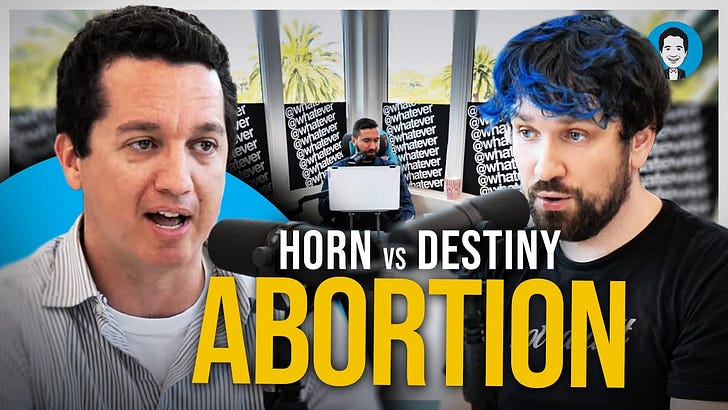Recently Trent Horn, a well-known pro-life debater and Catholic apologist, went on the “Whatever” podcast to debate “Destiny” (whom I do not know much about). It was an interesting exchange, but more than anything else to me, it exhibited glaringly the problems that can crop up with informal debates. These involve the qualities of the debaters themselves, the types of arguments used, and whether the debaters even have a common frame of reference in which to argue about.
1. The Best Debater Wins, Not the Best Argument
The abilities of the debaters more often determine who won the debate over who had the best arguments, if not the truth on their side. One particular case that I saw on YouTube comes to mind that was not actually a debate but a question-and-answer period after a pro-life speaker had finished giving a talk. One of the students got up who was apparently very loud and argumentative by nature and basically berated the speaker into silence, not even allowing her to answer. I don’t recall the student’s arguments being particularly rational, but no matter, she “won” that exchange.
In the case of Trent and Destiny, they came at it with different styles, but were well matched. Both debaters are formidable adversaries whom I would not want to come up against. For myself, I am not fast on my feet and require time to formulate what I want to say. In particular, I would be unable to cope well with Destiny’s speed talking and interrupting.
2. Use of Analogies
The constant use of analogies is another issue with debates. Their use is to illuminate, justify, or see the implications of a particular position by applying the same principles to a similar situation. While I’m not innocent myself in using them, the problem is that analogies can be out-and-out false. But even when they are not, they are never exact.
As an example, a justification for abortion is that it is permissible if a woman is too poor to have another child. Trent’s common analogy is to apply that logic to the woman’s two-year-old child. Can this child be killed using that same reason—that the woman is poor? It’s a great analogy, and I agree with it. The problem is that the analogy is not exact. A two-year old is not the same as an unborn fetus. It’s not that we cannot address this difference by arguing that the difference between the two does not give one less value as a human than other, but you have to make that separate argument. It gets complicated.
At their worst (and there are plenty of these on display in the Trent/Destiny debate), analogies are used to pin down your opponent by creating some horrible, often outlandish, situation that the other side is forced to agree must happen under their view of things. The problem is that, by design or not, you get away from the actual issue you are debating. Trent’s position was that pro-lifers value innocent life and are against killing anyone. Destiny tried to chip away at that by coming up with an analogy that implied that Trent, to be consistent, must keep something (represented as analogous to a human life) alive for an extended period in a Petrie dish. Trent attempted to address it but admitted later that he could have explained that it was too broad and thus a false analogy.
I found the whole idea silly. Had I the ability to respond, my answer would have been something like “perhaps we should defer that argument until the unlikely event that situation ever becomes reality. Now let’s get back to debating abortion, shall we?”
3. No Common Frame of Reference
This leads me to the next problem of debaters talking past one another with no common frame of reference. As an example, Destiny’s arguments were atheistic, or at least those of a practical atheist. He argued as if there is no objective truth, and that only the best human opinion should prevail. He also had several basic assumptions built into his arguments, such as that suffering is always a bad thing. But most importantly, the basis for all of his opinions is that he, not a greater power, gets to decide what is moral and correct.
While Trent argues without explicit reference to religion, underlying his position is theism, that there is objective truth. Thus, it’s God’s truth and reason that counts, and we must determine what that is and follow it. He does not believe that all suffering is bad, and that in fact God permits human suffering and evil for a greater good that we may not always see. The question in the end, for Trent, is about whether we are acting in accord with reason and truth (in other words, God’s will).
So, Destiny could go on and on about how Trent’s positions would allow women to suffer or allow a certain evil to continue in the world. On another plane from Destiny’s point of view, Trent’s position is that we do not have the moral right to stop one sort of suffering (a pregnancy due to a rape, for example) by committing another evil act (killing the unborn). One side says it’s our call to make; the other says that it’s to be decided by God’s will. Without this basic agreement, arguing about it is futile.
All that said, I am not against people coming together to debate. If nothing else, it’s an opportunity to hear both sides of an issue. They are, however, certainly a better experience for all concerned if the debaters allow each other a chance to make their arguments without so many annoying tactics (such as jabbering like they are on speed or continually interrupting the other). Ideally the exchange should be a search for the truth, not a competitive “got-you” match. This just makes it very frustrating to watch.




